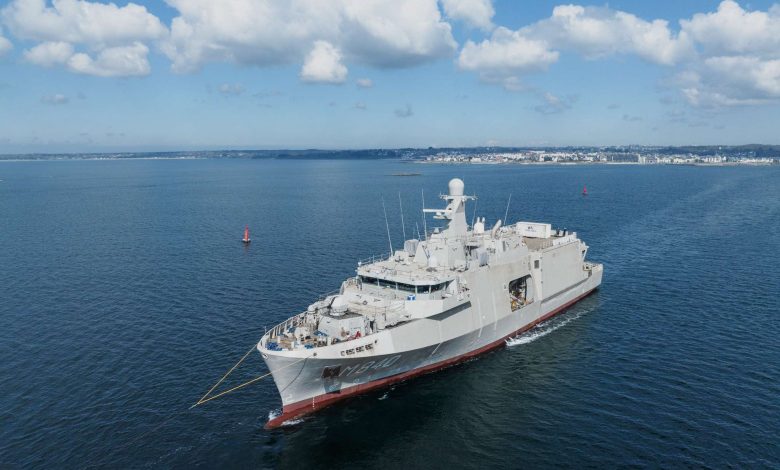
“Vlissingen’s Voyage: The Thrilling Debut Sea Trials of rMCM”
The Vlissingen, the second vessel in the series of mine countermeasure ships from the Belgian-Dutch rMCM collaboration, originally developed for the Royal Netherlands Navy, initiated its first sea trials from Concarneau, France, on March 27, 2025. The aim is to assess and confirm the ship’s operational capabilities at sea prior to its delivery at the end of 2025. The rMCM initiative is led by Belgium Naval & Robotics, a consortium consisting of Naval Group and Exail, with Kership (a partnership between Piriou and Naval Group) acting as the principal industrial contractor.
On this inaugural day at sea, the vessel’s functionalities were evaluated, focusing especially on her propulsion system and maneuverability. Further sea trial campaigns are planned to check all systems prior to her transfer at the close of 2025.
Eight vessels currently in production
The first ship, Oostende, designated for the Belgian Navy, is currently undergoing testing of its combat systems at the Naval Group shipyard in Lorient. Delivery is anticipated in the summer of 2025. The initial sea trials for Tournai, the third ship in the program and the second unit allocated to the Belgian Navy, are expected in late summer 2025. The fourth vessel, Scheveningen, the second ship designated for the Royal Netherlands Navy, was launched in November 2024. All twelve vessels contracted under the rMCM initiative are expected to be delivered before the end of 2030.
A unique industrial and European collaboration
The rMCM initiative, awarded in 2019 to Belgium Naval & Robotics, the alliance of Naval Group and Exail, signifies a vital component of European defense collaboration. Naval Group is responsible for vessel design, comprehensive mission system integration, evaluation, and commissioning. The ships are constructed and assembled by Kership and Chantier Piriou, under the overall industrial guidance of Kership, a joint venture between Naval Group and Piriou. Exail supervises the drones’ mission systems, with the majority of drones being produced and maintained at Exail’s Belgian subsidiary located in Ostend.
A resilient vessel with cutting-edge technology from BELGIUM NAVAL & ROBOTICS
These specialized and cyber-secured mine countermeasure (MCM) vessels are the first to have the capacity to launch and deploy a combination of surface drones (each a 12-meter, 19-ton vessel), underwater drones, and aerial drones. The mine countermeasure vessels will predominantly utilize an autonomous system for detecting, classifying, identifying, and neutralizing mines. This approach, featuring an integrated unmanned system, enables the safe and rapid clearing of mined areas—up to ten times faster than traditional methods.
The MCM vessels are engineered to withstand underwater explosions and have minimal acoustic, electrical, and magnetic signatures, in alignment with the missions they are set to undertake.
These mine countermeasure vessels have the following specifications:
- Length: 82.6m
- Width: 17m
- Displacement: 2800t
- Maximum speed: 15.3 knots
- Range: >3500 nautical miles
- Crew: 63 personnel (core team of 33 personnel)
- Drone capabilities: Exail UMISOFT Software suite, 2 unmanned surface vehicles (Exail Inspector 125), 3 autonomous underwater vehicles (A-18 equipped with Exail UMISAS 120 sonar), 2 towed sonars (T-18 equipped with Exail UMISAS 240 sonar), 2 Mine Identification & Disposal Systems (MIDS) (Exail Seascan and K-Ster C), 2 unmanned aerial vehicles (UMS Skeldar’s V200), and 1 Exail influence mine sweeping system incorporating 5 CTM magnetic modules and 1 PATRIA acoustic module.
- Embarkation capacity: 2 SOLAS rigid hull inflatable boats of 7m.
- Handling: 2 side launch & recovery systems for surface drones or commando vessels, a 15t specialized rear crane, and a 3t overhead crane.










